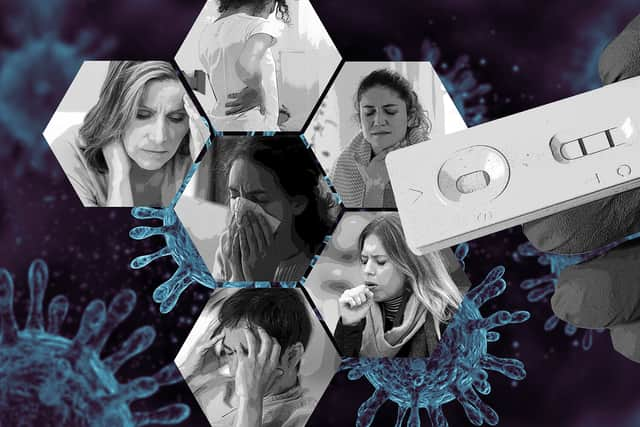What are the symptoms of Omicron? Signs of Covid variant - and how they differ to Delta and other strains
This article contains affiliate links. We may earn a small commission on items purchased through this article, but that does not affect our editorial judgement.
and live on Freeview channel 276
Confirmed cases of the Omicron variant are continuing to surge in the UK, prompting calls for new restrictions to be put in place.
New data released on Sunday (19 December) shows that Omicron infections have increased by more than 12,000, with cases in London alone topping 10,000.
Advertisement
Hide AdAdvertisement
Hide AdThe highly transmissible variant now accounts for around 80% of infections in the capital, according to the Health Secretary, and about 60% in England.
The Prime Minister attended an emergency Cabinet meeting on Monday (20 December) to discuss plans to address the rapidly rising case rates, with stricter measures being considered for the festive period.
With infection rates still high, these are all the key symptoms linked to the Omicron variant that you need to know, and how they differ from other strains.


What are the symptoms of Omicron?
Infection with the Omicron variant appears to cause “mild illness” for most people, based on findings so far, but it is still possible that symptoms could be more severe.
Advertisement
Hide AdAdvertisement
Hide AdDr Angelique Coetzee, a private practitioner and chair of South African Medical Association who first identified the variant, said that while patients have so far had “extremely mild symptoms”, more time is needed to fully understand the effect it could have on vulnerable people.
The following symptoms have all been linked to Omicron infection so far:
- Fatigue
- Body aches and pains
- Headache
- Scratchy throat
- Night sweats
- Dry cough
- Fever
- Runny nose
- Sneezing
- Nausea
Using the most recent data from London, scientists from the ZOE Covid Symptom Study also identified loss of appetite and brain fog as commonly reported symptoms of Omicron.
In most cases, symptoms will typically be mild and should only last for a few days.
Advertisement
Hide AdAdvertisement
Hide AdTaking a paracetamol and getting plenty of rest will help to ease the effects of infection, but if you are worried about your symptoms and are not sure what to do, you can get help from the NHS online, or by calling 111.
How do symptoms differ to Delta and other strains?
Patients infected with Omicron have reported symptoms that differ slightly to those associated with other strains.
Night sweats, which causes your body to sweat so much that your night clothes and bedding are left soaking wet, has only been linked to this new variant so far, and is not thought to be a common symptom of other strains.
A loss of taste or smell has also not yet emerged as a symptom of the Omicron strain.
Advertisement
Hide AdAdvertisement
Hide AdHowever, this is one of the most common indicators of infection from the Delta variant and the orignal coronavirus strain.
At the moment, the NHS lists a high temperature, a new continuous cough, and a loss of taste or smell as the three main symptoms of Covid-19.
However, with new symptoms being reported among Omicron patients, health experts are calling for guidance to be updated to make infections easier to detect.
Dr Amir Khan told ITV’s Lorraine that more symptoms need to be added to the NHS website to help keep track of cases.
Advertisement
Hide AdAdvertisement
Hide AdHe said: “The symptoms that are coming out of South Africa by the doctors that are looking after patients with Omicron show these five new symptoms.
“A scratchy throat, mild muscle aches, extreme tiredness, a dry cough and night sweats.
“Those kind of drenching night sweats where you might have to get up and change your clothes.
“And this is important. It’s important we keep on top of these symptoms, because if we’re going to keep track of Omicron here and worldwide we need to be able to test people with these symptoms.”
A message from the editor:
Advertisement
Hide AdAdvertisement
Hide AdThank you for reading. NationalWorld is a new national news brand, produced by a team of journalists, editors, video producers and designers who live and work across the UK. Find out more about who’s who in the team, and our editorial values. We want to start a community among our readers, so please follow us on Facebook, Twitter and Instagram, and keep the conversation going. You can also sign up to our newsletters and get a curated selection of our best reads to your inbox every day.
Comment Guidelines
National World encourages reader discussion on our stories. User feedback, insights and back-and-forth exchanges add a rich layer of context to reporting. Please review our Community Guidelines before commenting.
